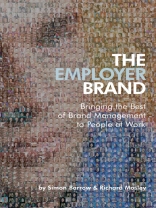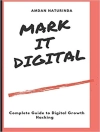Levels of ’employer brand awareness’ are rising fast across Europe,
North America and Asia-Pacific, as leading companies realise that
skilled, motivated employees are as vital to their commercial
success as profitable customers and apply the principles of
branding to their own organization. Starting with a review of the
pressures which have generated current interest in employer
branding, this definitive book goes on to look at the historical
roots of brand management and the practical steps necessary to
achieve employer brand management success – including the business
case, research, positioning, implementation, management and
measurement. Case studies of big-name employer brand stories
include Tesco, Wal-Mart, British Airways and Prêt a Manger.
Зміст
List of Illustrations.
Acknowledgements.
Preface.
PART I: THE RATIONALE FOR CHANGE.
1. Birth of an Idea.
2. Changing Needs and Aspirations of Employees.
3. Investors Awaken.
4. The People Management Challenge.
5. The role of leadership.
PART II: THE HOW TO GUIDE.
6. Brand Fundamentals.
Functional Benefits.
Emotional Benefits.
Higher Order Benefits, Brand Values and DNA .
Brand Personality.
Brand Positioning and Differentiation.
Brand Hierarchy.
Brand Vision and Brand Reality.
Brand Management and Development.
Brand Consistency and Continuity.
Brand Development.
Summary.
7. The Business Case.
Major Benefits of Employer Branding.
Lower Costs.
Customer Satisfaction.
Financial Results.
Summary.
Young, Fast Growing Companies: Attracting ‘The Right Stuff.’
Coming of Age: Capturing the Organisational Spirit.
Going International: Translating the Employer Brand into New Contexts.
Merger and Acquisition: Forging a Shared Sense of Identity and Purpose.
Corporate Reinvention: refreshing the Self-Image.
Revitalizing the Customer Brand Proposition: Living the Brand.
Burning Platform: Re-instilling Fresh Belief.
Benefits to the HR Function.
Benefits to the Internal Communications Function.
Benefits to the Marketing Function.
Winning Support from the Top.
Summary.
8. Employer Brand Insight.
Employee Insights.
Employee Engagement and Commitment.
Benchmarking.
Correlation Analysis.
Continuous Research.
Culture Mapping.
Brand Roots.
Projective and Enabling Techniques.
Observation.
Segmentation.
Communication Audits.
Additional Sources.
Labour Market Insights.
Clarifying the Target Market.
Needs and Aspirations.
Employer Brand Image.
Summary.
9. Employer Brand Positioning.
Brand Identity.
Monolithic.
Parent .
Subsidiary.
Brand Integration (Customer and Employer Brands).
Corporate Brand Hierarchy (Parent and Subsidiary).
The Key Components of the Positioning Model.
The Brand Reality model.
The Brand Vision Model.
Target Employee Profiles.
The Employer Brand Proposition.
Values.
Personality.
Benefits.
Employee Value Propositions.
Reasons to believe.
Summary.
10. Employer Brand Communication.
Identity.
Internal Launch.
Rational Understanding.
Emotional Engagement.
Employee Commitment and Behaviour Change.
Summary.
11. Employer Brand Management.
Big Picture: Policy.
External Reputation.
Internal Communication.
Senior Leadership.
Corporate Social Responsibility.
Internal Measurement Systems.
Service Support.
Local Picture: Practice.
Recruitment and Induction.
Team Management.
Performance Appraisal.
Learning and development.
Reward and Recognition.
Working Environment.
The Key Responsibilities of Employer Brand Management.
Summary.
12. The Durability of the Employer Brand Concept.
PART III: APPENDICES.
Appendix 1: Reuters Case Study.
Appendix 2: Tesco Case Study.
Appendix 3: Extract from Greggs Development Review.
References.
Index.
Про автора
Simon Barrow and Richard Mosley are colleagues in the
London based management consultancy People in Business, whose work
with senior managers to improve their organisation’s
performance is driven by the thinking in this book.
Simon Barrow was a brand manager at Best Foods (now Unilever) and
Colgate-Palmolive before becoming CEO of an advertising agency
within the Charles Barker Group, where his growing involvement with
HR sparked his creation of the Employer Brand concept and
subsequent research with London Business School.
Richard Mosley has been involved in brand strategy development and
implementation for nearly twenty years, including eight years with
WPP’s marketing consultancy Added Value where he led the
internal marketing practice.
Both authors share a belief in the need for marketing and HR to
work together more effectively, especially in businesses which rely
on people to deliver the customer brand experience.
People in Business’s recent clients include BP, British
Airways, Hiscox, John Lewis, Man Investments and Unilever.












